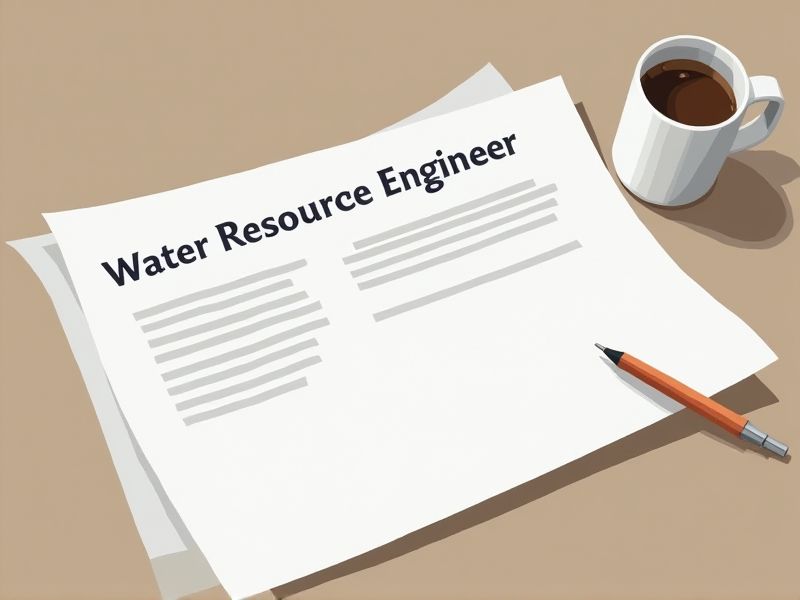
Water Resources Engineers play a vital role in managing and developing water systems to ensure efficient use and sustainability. Certain certifications enhance their ability to design, analyze, and implement complex water projects by providing specialized knowledge and skills. Certifications also validate expertise, increase credibility, and often result in better job prospects and career advancement opportunities. Key certifications you may need for Water Resources Engineering include Professional Engineer (PE) licensure, Certified Floodplain Manager (CFM), and CAD certification.
Professional Engineer (PE) License
A Professional Engineer (PE) license is required for a Water Resources Engineer to ensure the credibility and competency necessary to handle vital infrastructure related to water safety and distribution. The license serves as a validation of the engineer's expertise and adherence to industry standards, thus enhancing public trust. Regulations often mandate licensed engineers to approve designs and sign off on critical projects, reflecting the significant responsibility entrusted upon them. Possessing a PE license may lead to more job opportunities, as many employers prefer or even require it for advanced engineering roles.
Engineer-in-Training (EIT) Certification
The EIT certification serves as a foundational step for water resources engineers, ensuring they possess essential technical knowledge and analytical skills. Employers often require this certification as a benchmark to verify an engineer's commitment and potential for growth within the profession. Holding an EIT status signals a readiness to tackle complex projects and collaborate effectively with licensed professional engineers. The certification is a stepping stone towards obtaining a Professional Engineer (PE) license, which is crucial for career advancement and leadership roles in water resources engineering.
Certified Floodplain Manager (CFM)
Possessing a Certified Floodplain Manager (CFM) credential provides water resources engineers with a comprehensive understanding of floodplain management practices, ensuring alignment with national and local regulations. By acquiring CFM certification, engineers enhance their ability to design projects that mitigate flood risks and protect communities. Holding a CFM fosters heightened professional credibility, leading engineers to be more competitive in securing projects and gaining the trust of stakeholders. Knowledge gained through CFM certification aids in applying current methodologies and technologies, which contribute to more sustainable water management solutions.
Certified Water Specialist (CWS)
Certified Water Specialists possess essential expertise in water treatment processes, directly influencing the effectiveness of water resource management. Their knowledge ensures compliance with regulatory standards, which impacts the quality and safety of water systems. By understanding advanced filtration and purification methods, they actively improve resource sustainability and overall public health. Integrating their skills, a water resources engineer can optimize system designs, leading to enhanced efficiency and reduced environmental impact.
Certified Environmental Professional (CEP)
A Certified Environmental Professional (CEP) ensures that Water Resources Engineers apply sustainable practices compliant with environmental regulations. Their certification provides credibility and trust, fostering stakeholder confidence in water management projects. A CEP's expertise in environmental impact assessments aids in minimizing ecological damage during engineering processes. With a CEP, Water Resources Engineers enhance their capability to deliver efficient, eco-friendly solutions, promoting environmental stewardship within the industry.
LEED Accredited Professional (LEED AP)
A LEED Accredited Professional (LEED AP) in the field of water resources engineering can enhance sustainable water management by integrating LEED guidelines that prioritize water efficiency in projects. Their expertise aids in designing systems that minimize water waste and reduce the environmental footprint, aligning with sustainability goals. The LEED AP credential indicates proficiency in green building practices, which is crucial for developing innovative solutions for water reuse and stormwater management. This accreditation can also strengthen project proposals by demonstrating a commitment to sustainable, eco-friendly practices, potentially attracting environmentally-conscious clients.
Project Management Professional (PMP)
Obtaining a Project Management Professional (PMP) certification equips water resources engineers with structured methodologies to efficiently manage complex projects. PMP certification ensures engineers can effectively allocate and control resources, which is critical for managing the financial and environmental aspects of water projects. This credential enhances credibility and trust with stakeholders who require assurance of competency in delivering sustainable and compliant water management solutions. Having PMP certification can lead to increased project success rates by applying industry-standard practices and improving risk management in water resource engineering.
Geographic Information Systems Professional (GISP)
A Geographic Information Systems Professional (GISP) is essential for a Water Resources Engineer because precise spatial data enables accurate modeling of water flow and resource allocation. GIS technology facilitates the management and visualization of complex hydrological data, enhancing decision-making and infrastructure development. Professionals skilled in GIS can effectively track changes in water bodies and predict potential risks like flooding. Integrating GIS expertise ensures better planning and sustainable management of water resources, addressing both current demands and future challenges.
Certified Professional in Erosion and Sediment Control (CPESC)
The Certified Professional in Erosion and Sediment Control (CPESC) credential enhances a Water Resources Engineer's ability to effectively manage soil erosion and sedimentation issues, directly impacting water quality. Holding a CPESC ensures a thorough understanding of regulatory compliance, which directly affects project approval and implementation speed. The certification validates expertise in designing and implementing erosion prevention practices, which positively influences project sustainability and environmental protection. A CPESC credential equips engineers with the skills to mitigate erosion, thereby reducing long-term maintenance costs and environmental degradation.
Water/Wastewater Treatment Operator Certification
Water/Wastewater Treatment Operator Certification ensures that water resources engineers possess the necessary technical knowledge to design and manage effective treatment facilities. This certification provides engineers with credibility and demonstrates their commitment to maintaining public health standards. By having this certification, engineers are better equipped to address regulatory compliance issues associated with water treatment processes. The certification also enhances their understanding of operational challenges, which is crucial for optimizing treatment plant performance.
Summary
By obtaining certifications, you as a Water Resources Engineer can significantly enhance your credibility in the industry. This recognition often leads to new career opportunities, potentially resulting in higher earning potential. Employers tend to prefer certified engineers due to the assurance of specialized expertise and commitment to professional development. Consequently, your certified status can improve project efficiency and promote sustainable water management solutions.
